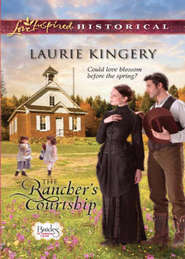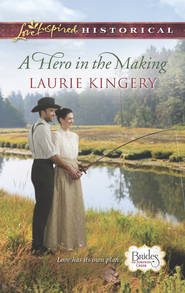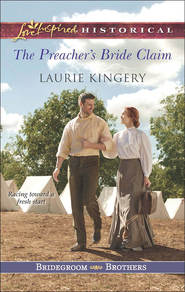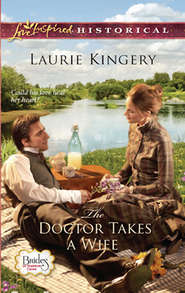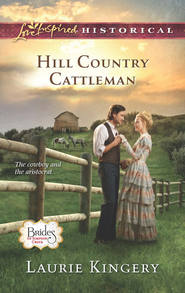По всем вопросам обращайтесь на: info@litportal.ru
(©) 2003-2024.
✖
Hill Country Christmas
Настройки чтения
Размер шрифта
Высота строк
Поля
Chapter Twenty-Six
Chapter Twenty-Seven
Chapter Twenty-Eight
Epilogue
Questions for Discussion
Chapter One
Llano Crossing, Texas—August 1867
“He was a good man, Miss Delia. He’s certainly in the arms of Jesus now.”
“God rest his soul.”
“God bless you in your time of sorrow, Miss Delia.”
The hillside that had been covered in the golden glory of a Texas spring when Reverend McKinney had begun to fade—primroses and coreopsis, gaillardia and red-centered Indian blanket, punctuated here and there by bluebonnets lingering from the month before—was now, after the summer sun had done its work, sere and brown. It seemed a fitting backdrop for the unrelieved black garments of the figures in the valley who stood around the deep rectangular hole into which a coffin had just been lowered.
Sorrow didn’t begin to name the endless depth of Delia’s grief. Her grandpa had been the only element of stability she had experienced in her eighteen years of life, and now he was gone.
Another voice intruded on her thoughts. “I’m sorry for your loss, Miss Delia. If you need anything, you have but to let me or any of my family know. Reverend McKinney was a pillar of this community, and we would not want his granddaughter to be in need.”
Under the black brim of her bonnet, Delia Keller raised her eyes to the speaker. “Thank you, Charles. I appreciate it.” If she had hoped for more from the mayor’s son, she made sure her face did not give her away. She didn’t want Charles Ladley’s pity, if that was all she could have from him.
The tight starched neckline of her borrowed bombazine mourning dress threatened to choke her.
Oh, Heavenly Father, what am I to do now?
A few of the ladies began to drift away from the gravestones toward the makeshift tables laden with covered baskets that were spread out under the live oak trees between the small church and the cemetery. Soon, Delia knew, they would have a hearty dinner spread out for those who had attended the funeral—ham and fried chicken, black-eyed peas, freshly baked biscuits, chocolate cake and pecan pralines. There would be pitchers of lemonade and cold tea. As the chief mourner, Delia would be expected to partake, sample and praise each lady’s culinary offering.
The thought of putting so much as a crumb in her mouth made nausea roil in her stomach. The noon heat beat down on her head through her bonnet. She couldn’t do it.
She’d thought everyone had left her side and she was alone at the grave site, but now Delia felt a gentle touch on her wrist. “Miss Keller, are you all right?”
It was Reverend Calhoun from Mason, who had kindly come to conduct the funeral, since Llano Crossing was now preacherless.
She looked away from the concern in his old eyes, afraid she would dissolve into tears but knowing it was safe to confide in him.
“What am I going to do, Reverend Calhoun? My whole life was taking care of my grandpa.”
He gave her an understanding smile. “You needn’t decide that today, my dear,” he reminded her. “You’ve suffered a loss, a grievous loss, and it’ll take a while to find your feet. But the Lord will show you a way.”
Delia blinked, wiping away a tear that managed to escape from her eyes. She had no patience with platitudes this morning. “The town will be finding a new preacher, and he’ll need to live in the parsonage—where am I to go? I have no money, no employment…” No beau, she added to herself. She wouldn’t be going to live in the beautiful white house Charles Ladley would build someday for his bride, and the worst thing was, she didn’t even know why not.
“The Lord will reveal all that to you, Miss Keller,” the preacher assured her, confidence mingled with compassion in his deep, resonant voice, “in the fullness of time. He takes care of the birds in the air and the lilies of the field, you know. Now come—it looks as if the good ladies of Llano Crossing have prepared a nice meal for you.” Nodding toward the tables under the trees, he said, “Why don’t we—”
“I…I don’t think I can stay for it,” she said quickly, keeping her gaze on the toes of her high-button boots, but away from the grave. “I just…I just want to go back to the parsonage and lie down.” While I still can lie down there—and try to imagine what I’m going to do.
“Nonsense, child, you need to put some food in your stomach, and take heart from the others who loved Reverend McKinney,” urged his wife, a comfortable-looking gray-haired woman who had returned to her husband’s side. “You’ll feel better after you’ve eaten a bite, I’m sure.”
Delia did not want to argue with her, and fortunately the visiting preacher made it unnecessary.
“Mrs. Calhoun, can’t you see the girl is pale as a wilted primrose? I’m sure she knows what’s best for her. There’s bound to be plenty of food left, and we can bring her a plateful to tempt her appetite after she’s had a nap. Miss Delia, we’ll see you later,” Reverend Calhoun said with finality. A look passed between husband and wife.
“All right, Mr. Calhoun, I’ll walk with her,” Mrs. Calhoun said, to Delia’s dismay. “You go say the blessing so everyone can start eating. I’ll be back in just a few minutes.”
Placing an arm around Delia’s waist, as if she feared the girl might swoon without it, Mrs. Calhoun started forward.
The parsonage sat some fifty yards down the road from the church. If she wasn’t allowed to walk home by herself, Delia figured that at least, once there, she would insist she could find her way to her bedroom without any help. She would be alone in minutes.
They had nearly reached the gate that let out onto the dusty road when they spotted the horse and rider trotting toward them from the west, trailed by a swirl of dust.
“If he’s coming for the funeral, he’s a little late,” Mrs. Calhoun said with a sniff.
“Oh, I don’t imagine he is,” Delia said. She thought everyone who had ever attended the Llano Crossing Church had been present for the funeral service. The church had been filled to bursting, with folks overflowing out onto the steps. “Probably just another cowboy coming into town to enjoy Saturday night.”
Mrs. Calhoun pursed her mouth. “And tomorrow all he’ll have is an aching head to show for his month’s wages.”
As the rider drew nearer, however, Delia began to doubt he’d come from any of the many nearby ranches. In back of the saddle were bulging saddlebags, a blanket roll and a rifle. The silver buckskin he rode was wet to his hocks, as if he’d just crossed the Llano at one of its deeper points upstream, rather than waiting to cross at the town that bore the name of the bridge that spanned the river.
He reined the horse to a walk a few yards away; then, as he reached them, he halted the horse with a soft whoa. He laid a finger on the broad brim of his hat in an automatic gesture.
“Ladies, is Llano Crossing up ahead?”
His voice was gravelly and rough, as if it had been unused for a long while. His eyes, which were studying her with a frankness she had never been subjected to, were the glacial gray-blue color of a wolf’s. She felt herself shiver as if the sudden chill breeze of a norther had blown upon her spine.
Out of the corner of her eye, Delia saw Mrs. Calhoun give a rigid nod. “Just around the bend in the road.”
“And would a traveler find a hotel there where he could pass the night?” he asked, without taking those wolfish eyes off Delia.
She saw Mrs. Calhoun stiffen even more before she replied, “He would, if he were a law-abiding, respectable sort.”
Delia saw the threat of a smile cross the stranger’s face like slow heat lightning. He looked as if he would ask something more of Delia, then apparently thought better of it. “Much obliged, ma’am,” he said, touching his hat brim yet again, his gaze drifting over to Mrs. Calhoun just long enough to be polite.
The corner of his mouth twitched as if it wanted to turn upward; then, as if noticing the somber hue of Delia’s black dress, it resumed its previous thin line as he nodded and touched the buckskin with his boot heel. “Ladies,” he murmured, and once he and the horse were a few yards from them, he nudged the horse into an easy lope.
Mrs. Calhoun sniffed again. “Well! He might have shown some respect.”
Delia glanced at her, surprised at the indignation in the woman’s voice. “He touched his hat.”
“I mean to our mourning, my dear! Why, he was staring at you like a wolf set loose in a sheep pen!”
Since a wolf was the very creature she had been reminded of also, Delia blinked in surprise. Mrs. Calhoun was probably expecting too much of the man, though, if she thought that the stranger would give a long, involved condolence speech merely because the two of them were dressed in black.
“A saddle tramp, I shouldn’t wonder,” Mrs. Calhoun muttered disapprovingly. “There are so many of them drifting through ever since the war. Like tumbleweeds.”






